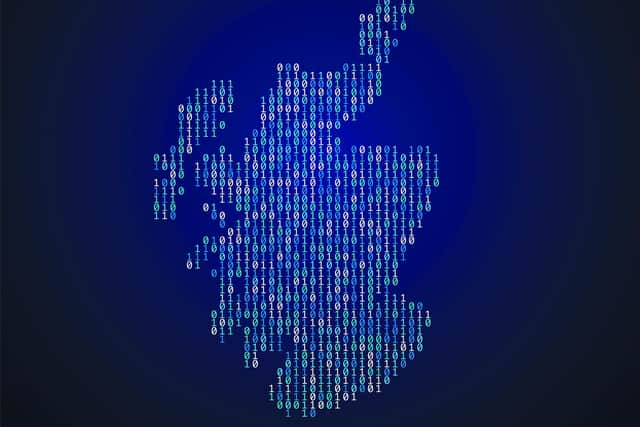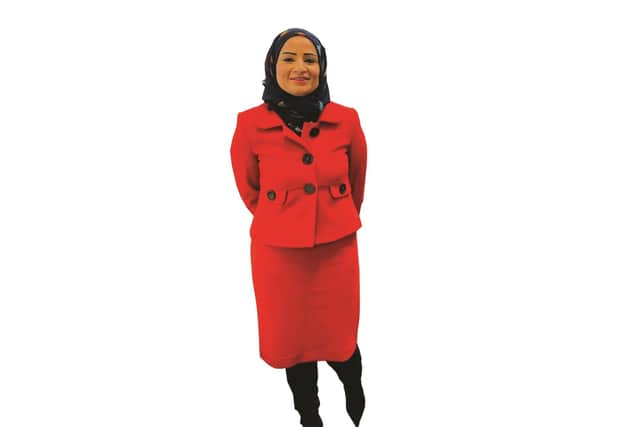Data Capital: Developing a good picture of health
“Why do I get out of bed every morning, what excites me to come in and do what I do? It’s the hope that I see around me,” says the effervescent chief officer of Public Health Scotland.
“It’s also the willingness at all levels, from strategic decision-making to the frontline, to give power and control to those living and breathing the services – the citizens. If I didn’t get the signal that is the direction we were travelling in, I wouldn’t be doing what I’m doing.”
Advertisement
Hide AdAdvertisement
Hide AdAhmad believes the idea of using data to empower citizens is now well accepted, but she wants to go a big step further, and that needs bravery.


“The next opportunity is working together to develop the future recovery of Scotland,” she says. “There are pockets where that is happening and we must not inhibit ourselves by putting in too much bureaucracy and governance, which stops innovation and stops the bravery of trying.”
She emphasises that she isn’t advocating removing bureaucracy and governance, but feels true inclusion means sharing data in a straightforward way, not wrapping it in red tape and jargon.
Ahmad talks about the power of storytelling – painting real-life pictures about what the analysis of data can achieve: “How can you tell a story if you don’t connect at a human level? It’s about building relational connections, as opposed to just professional ones.
“People don’t change because somebody’s thrown up some numbers in front of decision makers. Change happens through an emotive connection and the power of a story and lived experience, then taking that story and giving it power through evidence and insights.


“We understand the importance of good data – and especially transmissible data – when it’s not just the few that understand it.We all have a role to help the majority understand what information tells us”
Ahmad says that the The Community Empowerment (Scotland) Act puts power into communities and, to make this real, it must be supported by policy which is informed by insights derived from data.
Academia has a huge role to play here, she says: “We are already utilising those academic links to develop research to give us data that is timely and usable? That research and evaluation tells us where we need to take action in a timely manner – in areas like early intervention for children, or for young people.”
Advertisement
Hide AdAdvertisement
Hide AdHow do we make that real, for real people? In a previous interview, Ahmad said this: “If health data doesn’t join up with housing and community services data, for example,we won’t have theemotional intelligence to understand why a homeless person ends up in A&E54 times in a year.”
So where do we start if we want to achieve that? “There is a knowledge gap in understanding what data and data sets exist, and where to access data, at a Scotland-wide level,” Ahmad admits. “And there are still some areas of silo working. We recognise and we are addressing these issues to support multi-agency decision making.
“It’s about Public Health Scotland empowering our workforce – to help health and social care colleagues understand, emotionally, how to interpret data correctly. It’s fine understanding what’s there in front of you, but our ambition is to better interpret data that links together cross-sector activities and outputs for better outcomes.
Ahmad says the key to achieving this is “data outputs” – what information goes out for public consumption.
“We remain committed to be an organisation that is data and intelligence led, outcomes focused, trusted, operating across local, regional and national levels, and is a collaborative leader
“We are continuing to improve the diversity across the data landscape, including the collection of differing characteristics.
“Data is captured, and quality-checked, then insights are produced. There’s a whole funnel of activity and it’s not just data coming in, it’s how it goes out – if it isn’t translatable or digestible,nobody is going to be able to take the right action in a timely manner.”
She uses an example: “Waiting times in A&E and community care data are recorded in various systems and sometimes analysed separately. We need to start with the difference we want to make for people, rather than focusing on the challenges with systems and infrastructure that don’t talk to each other.”
Advertisement
Hide AdAdvertisement
Hide AdThe key to future success, Ahmad believes, is using health and social care data to create an effective “whole system model”.
“This helps service planners identify challenges in patient flow and capacity before they actually happen. So we collect, process, manage and share health and social care data. But we’ve also got primary care, homelessness and education data. As we jointly build the whole system, we’re in a great place in Scotland including having the CHI [Community Health Index] number supporting in linking different datasets.”
As the PHS whole system model evolves, Ahmad says, it can have a hugely positive impact on future services.
“The whole system modelling programme goes beyond just simply reporting data. It models it to dissipate peaks and troughs in demand and capacity so people can better use resources and capacity they have to meet the demand. These forecasts allow service planners to anticipate pressures on the wider health and social care system and to make better use of resources, and allow health and care systems for example, to monitor system pressures, plan recovery from Covid-19, or plan for winter pressures.”
A good example of sharing wlder datasets, Ahmad says, is the work on EAVE II (Early Assessment of Covid-19 epidemiology and Vaccine/Antiviral Effectiveness).
“This was research that went beyond academia and shaped practical action in Scotland. EAVE II findings published in The Lancet showed that vaccines reduced the number of people hospitalised by Covid-19. Randomised controlled trials had already shown the vaccines were safe and effective, but EAVE II provided the first evidence that it had an effect at a national level.
“So that’s taking different types of data and bringing that together – in this case, linking vaccination data with data on people going into hospital, using the unique CHI number.”
Ahmad thinks Scotland should have made more of being the first in the world to publish such findings: “I think we hid our light under a bushel, because we moved so fast onto the next thing.
Advertisement
Hide AdAdvertisement
Hide Ad“There’s something about stopping and reflecting on what we achieved. There was a lot of fantastic work done and it was an example of taking data to the next level.”
Manira Ahmad will be a speaker at The Scotsman’s Data for Diversity conference at the University of Edinburgh on 29 September.
Dashboard puts public in driving seat
Another area where Manira Ahmad believes Public Health Scotland data has been utilised effectively to deliver benefits is the wide use of its Covid-19 dashboard by individuals around the country.
“This was relevant data presented in a way that connects with the broad audience,” she says.“While the success of the Covid dashboard won’t be repeated for every set of statistics, it presents us with lessons on how to bring statistics to life.
“If we were a social influencer, we’d be right at the top with the number of hits to our website!
“And we weren’t territorial; people were picking up the data, using it, manipulating it, and repurposing it. I was proud of that because they were using Public Health Scotland data, although presenting in a different way that would make sense to many others that we may not be able to with our way of formatting.
“We allowed individuals to be able to access that data, then to use and repurpose it to tell their stories, and influence a larger community.
“Travelling Tabby for example [the individual behind the nationally acclaimed Scotland Coronavirus website], picked up our data – and I don’t think that would have happened if we hadn’t been as innovative as we were in presenting the Covid-19 dashboard.”
